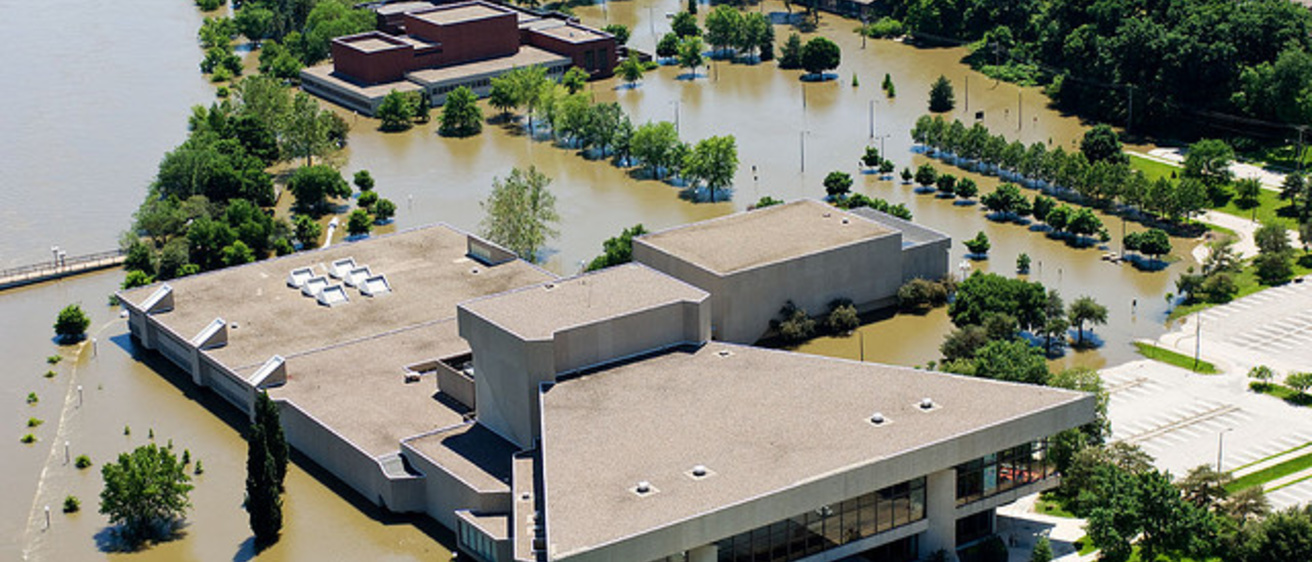The floods of 2008 and 2011 devastated many communities across the state.
Yet out of the destruction came opportunities that drew communities closer together, demonstrating the optimism and resilience of the human spirit, says University of Iowa Hancher Executive Director Charles Swanson.
From Friday, Nov. 30 through Sunday, Dec. 2, more than 30 teachers from seven targeted communities across the state that experienced flooding will come to the UI campus to participate in the first ever College of Education's Interdisciplinary Flood Institute for Teachers as part of the Living with Floods project. The institute is part of a larger Living With Floods project that aims to provide services to communities throughout the state.
Middle and high school teachers have been invited from Cedar Rapids, Council Bluffs, Davenport, Des Moines, Dubuque, Iowa City, and Muscatine. The institute will help teachers from these communities affected by the floods of 2008 and 2011 incorporate environmental learning into their classes, applicable to all content areas and disciplines, ranging from science and social studies to reading, writing, art, and music.
The institute is a three-day, two-credit-hours experience taught by UI College of Education faculty that provides a unique professional development opportunity, says College of Education Dean Margaret Crocco.

"Providing an opportunity for educators in Iowa to develop curriculum for their own students that is focused on understanding the causes of flooding and communities' resilience in the face of disaster will, I hope, be an educational as well as healing endeavor for schools, students, and communities," Crocco says.
Crocco adds that the teachers will spend this time on campus working with College of Education staff and researchers, as well as other UI scholars, to learn how to consider and develop flood-related curriculum relevant to their communities. To view an institute schedule, visit www.education.uiowa.edu/dean/flood.
In spring 2013, the teachers will teach a "mini-unit” based on their professional development experience. The products of these curricular efforts will become part of an exhibition, such as a science fair in each community or some other appropriate public event related to an overall commemoration of the 2008 and 2011 floods planned for June of 2013.
By providing their time and expertise, a group of College of Education faculty and staff members will make the institute possible, Crocco says, adding that $20,000 from generous Hancher donors allows her staff to offer the institute at no cost to teachers.
Crocco says when she first learned from Swanson and Carmen Langel, director of development and communication at IIHR—Hydroscience & Engineering, about the Living with Floods project, she was enthusiastic to participate by adding the teacher's institute.
"We modeled our institute on a teachers' institute that Dr. Greg Hamot runs each summer on global education," Crocco says. "The program is tied to the Iowa Common Core Curriculum and includes problem-based instruction with community involvement."
She adds that since she created a curriculum in 2007 at Teachers College, Columbia University for the 'Teaching The Levees' project ( www.teachingthelevees.org) based on Spike Lee's film When the Levees Broke about Hurricane Katrina, she was familiar with the intellectual and pedagogical challenges associated with teaching about disasters.
Institute coordinator Hamot says that this institute is unique in several ways.
"This institute, unlike many, focuses on teachers and students who experienced the actual subject matter first-hand. That's a rare moment when teachers can develop curriculum based on their and their students' experiences, as well as those of their community," Hamot says. "It's a great opportunity for the community, students, and teachers to realize the changes that took place due to the floods in their area and the ways in which people coped, or didn't, and how the community moved forward in spite of the trauma and adversity that result from such a natural disaster."
The College of Education has developed a set of flexible curricular frameworks and activities in each school subject, along with a menu of options for final projects and assessments, upon which the teachers will build a curriculum specific to their communities’ experience with recent floods, Hamot says.
The ultimate goal is to coordinate student-developed products with Hancher-planned events and the other Living with Floods partners with the Preservation Hall Jazz Band concerts in each community June 7-16, 2013.
Swanson says that he and other colleagues on campus came up with the idea for the Living with Floods project in February of 2011.
"The Living With Floods Project will commemorate recent floods, celebrate progress made towards recovery, and raise awareness of strategies to mitigate floods as well as the interconnectedness of our environment and watershed," Swanson says.
The Living with Floods interdisciplinary initiative is a collaborative effort between Hancher, College of Education, College of Engineering, the Iowa Flood Center, the Center for Global and Regional Environment Research, the State Hygienic Laboratory at the UI, and iExploreSTEM.
For more information on the teachers institute, contact Crocco at 319-335-5380 or Hamot at 319-335-5382. For more information on the Living with Floods project, contact Swanson at 319-335-1133.
Editor's Note: Reporters, photographers, or videographers who wish to cover the institute should call Jean Finley at 319-400-3062 or email her in advance at jean-finley@uiowa.edu. Most of the institute will take place on the UI campus in the Lindquist Center, at the corner of Madison and Burlington Streets. The best time to cover the institute is Saturday, Dec. 1, from 11 a.m. to 3 p.m. The UI's World Beat Ensemble will perform from 2:30 to 3 p.m. Members of the media are encouraged to first check in with Finley in Room N140, the College of Education's Teacher Leaders Center, in Lindquist.
